- Home
- Michael Crichton
Binary Page 4
Binary Read online
Page 4
Page 4
Graves worked for two years in the Army as a Slavic translator, and after his discharge joined the State Department in the same capacity. The pay was good and the work was interesting; he had the feeling of being useful, of doing necessary and even important work. In 1959 he married a girl on Senator Westlakes staff. They had a daughter in 1961. They got divorced two years later. He had a kidney stone and spent five days in the hospital. He met a nice girl, almost married her, but didnt. He bought a new car. He moved to a new apartment.
In retrospect, these seemed to be the signposts, the significant shifts and alterations in his life. The years went by: he wore his hair a little longer, but the hair was thinner, exposing more of his temples. His trousers got tight, then flared, and now were baggy again, as they had been in the fifties. There were cyclic changes in himself and his world - but he was still working for the government.
State no longer wanted Russian translators. The big push was for Chinese and Japanese translators. Graves transferred into Intelligence, a division of State that was highly mathematical, heavily computerized. He worked in the foreign division for five years, doing a lot of code breaking. At that time the foreign embassies were all utilizing computer-generated codes of various kinds, and it was challenging work - even if the messages usually turned out to be requests for funds to refurbish the ballroom on the second floor, or to hire additional kitchen help. Graves was interested in the codes, not in the content.
In 1970 he was moved to the domestic end. It seemed a minor change at the time, and a change he welcomed. He was ready to do something different. It was a long time before he realized just how different it was.
During his fifteen years in the government, slowly and imperceptibly his enemy had shifted from the Big Bear, the Russkies, the Reds, the ChiComs - to his fellow Americans. That was his job now, and he hated it. It was tapping telephone transmissions and competing with other agencies; it was value judgements and it was very, very political.
Nothing was clean and direct any more. And Graves didnt like it. Not any more.
Graves had been planning to quit State for a long time, ever since his domestic work had become distasteful. But he hadnt quit.
What kept him was partly inertia and partly the fear that he might be unable to teach Slavic or mathematics. At least, that was what he told himself. He was reluctant to admit the real reason, even to himself.
The fact was that he took a genuine pleasure in his work. The pleasure was abstract, the pleasure of a compulsive jigsaw puzzle worker who will fit the pieces together without caring what the puzzle really means. It was a game he loved to play, even if it was fundamentally nasty.
He also liked the notion of an opponent. In the foreign division he had been up against institutions -embassies, foreign press corps, political groups of various kinds. In the domestic division, it was most often a single individual.
Graves had long ago discovered his skill at poker, backgammon, and chess - games which required a combination of mathematical insight, memory, and psychological daring. To him the ideal was chess -one man pitted against another man, each trying to calculate the intentions of the other in a game of enormous complexity with many alternatives.
That was why he had agreed to leave Washington in order to follow the activities of John Wright. In the realm of puzzles and games, nothing was more challenging than John Wright.
He and Wright were well matched: the same intelligence, the same mathematical background, the same fondness for games, particularly chess and poker.
But now after three months, Phelps was rolling him up. Wright would be arrested; the game would be called off. Graves sighed, trying to tell himself that this did not represent a personal defeat. Yet it was; he knew it.
With a low whine the plane began its descent towards San Diego, skimming in over the roofs of the highest buildings. Graves didnt much like San Diego. It was a utilitarian town dominated by the needs of the Navy, which ran it with a firm, conservative hand. Even its sins were dreary: the downtown area was filled with bars, pool halls, and porno movie houses which advertised `Beaver films - direct from Frisco! as if San Francisco were six thousand miles away and not just an hour up the coast. Fresh-faced sailors wandered all over the downtown area looking for something to do. They never seemed to understand that there was nothing to do. Except, possibly, to get drunk.
Despite the early hour San Diego was hot, and Graves was grateful for the cars air conditioning. Lewis drove away from the airport, glancing occasionally at Graves. `The marshals checked in with us an hour ago.
`So you know?
`Everybody knows. Theyre just waiting for you to say the word.
As they left the airport they passed beneath a banner stretched across the road: WELCOME REPUBLICANS. Graves smiled. `Im going to hold off for a while, he said. `At least until this afternoon.
Lewis nodded and said nothing. Graves liked that about him, his silence. He was young and enthusiastic - characteristics Graves severely lacked - but he knew when to keep his mouth shut. `Well go directly to his apartment, he said.
`All right, Lewis said. He didnt ask why.
`What time did Wright quit last night?
`Nine. Lights out at nine.
`Rather early. Graves frowned. It was rare for Wright to go to bed before midnight. ,
`Duly noted on the time-clock sheets, Lewis said. `I checked them myself this morning.
`Has he ever done that before? Gone to bed at nine?
`July fifth. He had the flu then, you remember.
`But hes not sick now, Graves said, and tugged at his ear. It was a nervous habit he had. And he was very nervous now.
There were a lot of cops stationed on the road from the airport to the city. Graves commented on it.
`You havent heard? Lewis said.
`Heard what?
`The Presidents coming in today.
`No, Graves said. `When was that decided? This is only the second day. Im surprised hed show before hes nominated.
`Everybodys surprised. Apparently he intends to address the Convention delegates before the balloting.
`Oh?
`Yeah. Lewis smiled. `Its also apparently true that there are some squabbles in the rules committee and the platform committee. Hes going to straighten that out.
`Ah. It was making more sense. The President was a practical politician. Hed sacrifice the drama of a grand entrance if he had to get a political job done earlier.
`We just got the word a couple of hours ago, Lewis said. `Same with the police. Theyre furious. The Chief has been making statements about how hard it is to provide security. . . He gestured at all the wait- ing cops. They were stationed every thirty yards or so along the road. `I guess he managed.
`Looks like it. What time is he due?
`Around noon, I think.
They drove on in silence for a while, leaving the coast road and heading into the centre of town. Graves noticed that Broadway had been dressed up, its honkytonk glitter subdued a little. But there were a lot of tough-looking girls around.
Lewis commented on it. `The City Fathers are going crazy, he said: `About that. He jerked his thumb towards one spectacularly constructed girl in a tightly clinging pants suit.
`I thought it wasnt allowed. Traditionally San Diego was free of hookers despite the large sailor population. Tijuana was just twenty minutes away; those services were usually provided across the border.
`Nothing they can do about it, Lewis said. `Just in the last few hours theyve all been coming in. Every damned hooker for a thousand miles is here. All the girls from Vegas and Reno and Tahoe. Its the Convention.
`But the City Fathers dont like it.
`The City Fathers hate it, Lewis said, and grinned. It was a youthful grin, the grin of a person who still found sin amusing, risque, fun.
Graves could no longer find the fun in prostitution. Why not? he wondered. Was it age - or was it striking som
e uncomfortable chord in himself?
But he didnt pursue the thought. Lewis turned left, going up into the hilly section of town towards Wrights apartment.
HOUR 9
SAN DIEGO
8 AM PDT
Lewis slowed as they approached a dry cleaning van advertising 24 HOUR SERVICE AT NO ADDITIONAL CHARGE and PLANT ON PREMISES.
`You want to talk to 702? Lewis said.
`Yeah, for a minute, Graves said.
Lewis pulled over. Graves got out. The driver in the van wound down his window.
`I hear youre rolling it up, the driver said.
`Thats right, Graves said.
`When?
`Later today.
`Whats proto until then? Proto was slang for protocol.
`Business as usual, Graves said. `Wheres 703?F
Off duty today. The driver shrugged.
`Call them in. I want them to pick up the girl this morning.
`Oh?
`Yeah.
`Anything else?
`Yeah. You got some coffee in there?F
Sure. Two cups?
Graves looked into the sedan at Lewis. `You want coffee?
Lewis shook his head.
`Just one, Graves said. `Black with four sugars.
The driver sighed and looked into the interior of the dry cleaning van. `Give the boss his usual,. he shouted. A moment later a styrofoam cup was passed out to Graves.
`Youre going to catch diabetes, the driver said.
`This is breakfast, Graves said, and walked back to his car. In the background he heard the van driver saying, `702 to 703. Over. 702 to 703. Over.
Graves got in the car, slammed the door. To Lewis: `Lets go.
`The apartment?
`The apartment.
Wright had taken a fashionable apartment in the hilly north-central section of San Diego, not far from the Cortez Hotel. His building looked out over the city and the harbour. At this hour people were leaving the apartment house, standing in front and waiting until the doorman brought their cars around from the underground garage. Graves had had some trouble getting used to that when he first came here. He was accustomed to the East, where people in cities walked to work or took public transportation. In California, everybody drove. Everybody.
Wright himself was an exception. He had a driver and a limousine. But then, Wright was always an exception, he thought.
Wright usually came out about 8:20. His girl for the night - one of five or six he saw with some frequency - preceded him by ten or fifteen minutes.
`There she is, Lewis said.
Graves nodded. It was odd how you could yell Wrights irls. Even from across the street they co,zld be spotted instantly. Yet there was no particular physical type, no particular details of dress. They werent professionals. But there was a certain quality about them, something blatantly erotic. They were the girls a man would choose if he wanted to be reassured. Graves watched this one, who wore a simple white dress and had very long legs, as she climbed into a Datsun sportscar and drove off.
`701 to 703, he said, speaking into the intercom mounted on the dash.
There was a crackle of static. `703 here. I thought we could sleep in today.
Graves ignored the complaint. `Red Datsun sportscar, convertible, California licence ZVW 348. Got it?
`Got it. Out.
A moment later, a Ford station wagon drove past them, and the driver gave them the high sign briefly. That was 703.
Graves slumped down in his seat, thinking. They had not bothered to interrogate Wrights girls in recent weeks. When they began, they had had dozens of interviews with the girls. Sometimes they had been straight interrogations; more often they were casually arranged meetings. In both cases the information was monotonously the same. John Wright was a nice and kind and generous and charming man. He was also nervous and definitely conservative. He sweated a lot, preferred the missionary style, kept the room dark, and always remained a little aloof.
Hardly valuable intelligence insight.
`Why do you want this one? Lewis asked. And then he said, `Here comes the limo.
A black Lincoln limousine pulled up in front of the apartment building. The chauffeur, George Marks, got out, buttoned his uniform jacket, and stood by the door of the passenger side.
Graves had never picked George up for questioning. It had seemed too risky. Now he wondered if that had been a mistake. But he could think of a hundred possible mistakes he had made, especially today. Especially when Wright was being arrested.
`Why are they going to arrest Wright? Lewis asked. He hadnt got an answer on his previous question, so he was trying another.
Graves lit a cigarette. `Phelps is nervous.
`But this computer-tapping business isnt enough -
`Phelps is running scared just now. Theres talk of closing down his division of Intelligence. In fact, the new Secretary is thinking of closing down all State Intelligence work.
Lewis raised his eyebrows. `Whered you hear that?
Graves smiled. `Im in Intelligence myself.
Lewis glanced at him a moment, then looked back out the window. A man emerged from the apartment building - stocky, neatly dressed, moving purposefully.
`Theres Wright, Lewis said and started the engine of his car.
Graves had watched John Wright get into his limousine every morning for sixty-six days. He knew the routine well: George opened the door and tipped his cap; Wright nodded to him, bent over at the waist, and slipped quickly into the back seat. George closed the door, paused to tug at his leather gloves, and walked around to the drivers side. In the back seat Wright stared straight ahead or opened his newspaper to read.
But this time John Wright stared across the street directly at Graves. And he continued to stare until the limousine moved off in the hot San Diego morning.
Lewis was now very good at following in San Diego traffic; he kept pace - three cars back. After a time Lewis said, `He was looking at you.
`He certainly was. .
`Do you think hes on to us?
`Impossible, Graves said. He thought of the closet in his apartment. He had five distinctly different suits in that closet, and he rotated them on different days. He thought of the three sedans and the four delivery trucks that the Department used for surveillance work. Different manufacturers, different colours, and a new licence plate every week. He had never parked in the same place, never waited for Wright in the same way. He had never presented Wright with a recognizable pattern.
`Impossible, he said again.
And then Graves thought of himself. If he were Wright, would he discover that he was being followed? Even with all the precautions, the safeguards, the changes? He liked to think that he would.

 Dragon Teeth
Dragon Teeth Jurassic Park
Jurassic Park Micro
Micro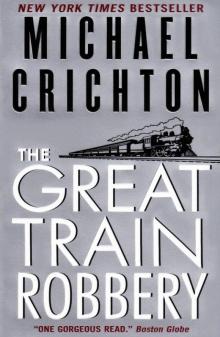 The Great Train Robbery
The Great Train Robbery The Andromeda Strain
The Andromeda Strain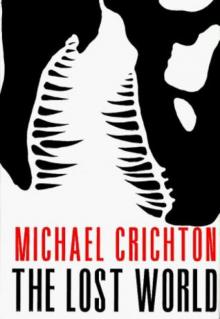 The Lost World
The Lost World Congo
Congo Travels
Travels Timeline
Timeline Sphere
Sphere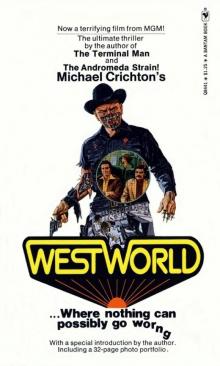 Westworld
Westworld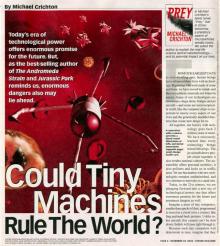 Prey
Prey State Of Fear
State Of Fear Next
Next Disclosure
Disclosure Pirate Latitudes
Pirate Latitudes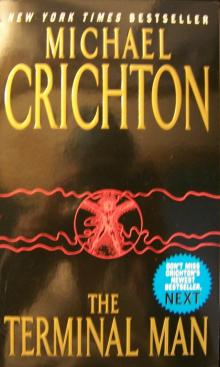 The Terminal Man
The Terminal Man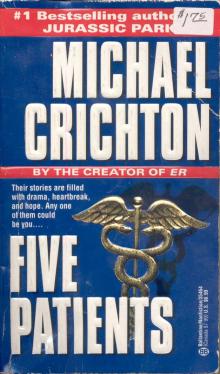 Five Patients
Five Patients Rising Sun
Rising Sun Binary
Binary The Andromeda Evolution
The Andromeda Evolution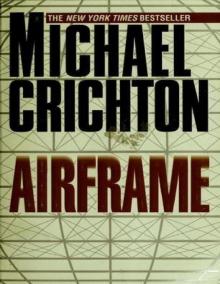 Airframe
Airframe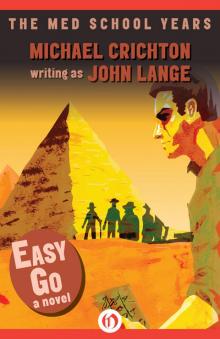 Easy Go
Easy Go Drug of Choice
Drug of Choice Odds On: A Novel
Odds On: A Novel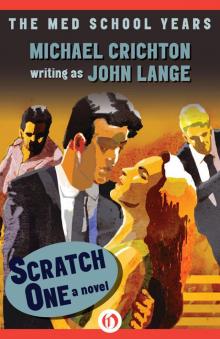 Scratch One
Scratch One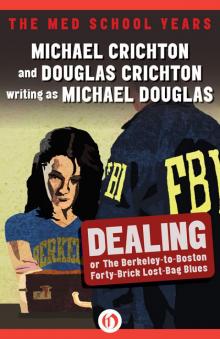 Dealing or The Berkeley-to-Boston Forty-Brick Lost-Bag Blues
Dealing or The Berkeley-to-Boston Forty-Brick Lost-Bag Blues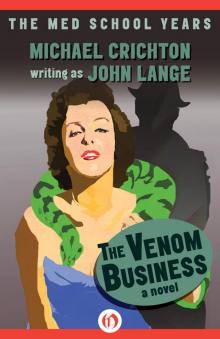 Venom Business
Venom Business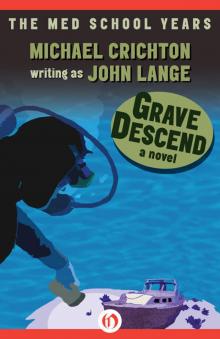 Grave Descend
Grave Descend Gold - Pirate Latitudes
Gold - Pirate Latitudes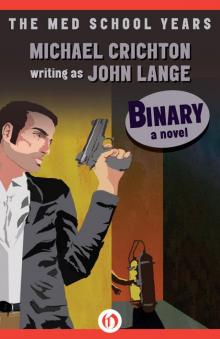 Binary: A Novel
Binary: A Novel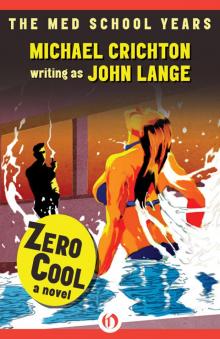 Zero Cool
Zero Cool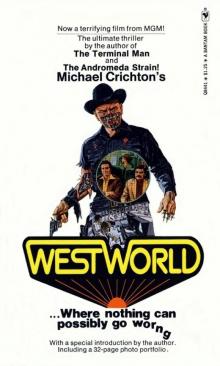 Delos 1 - Westworld
Delos 1 - Westworld